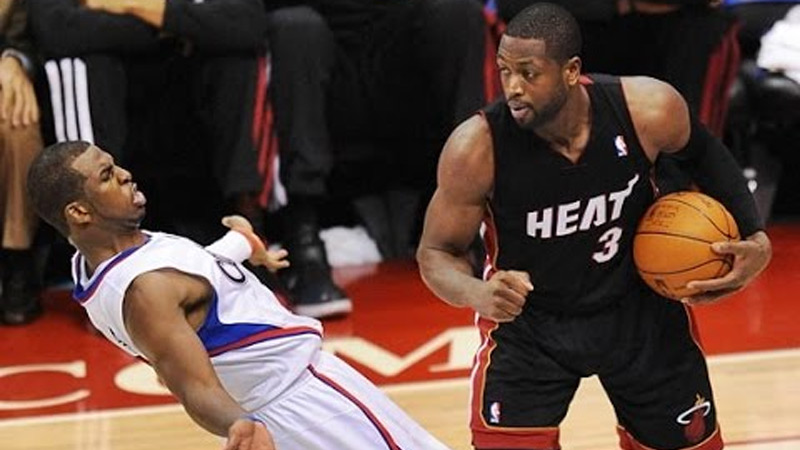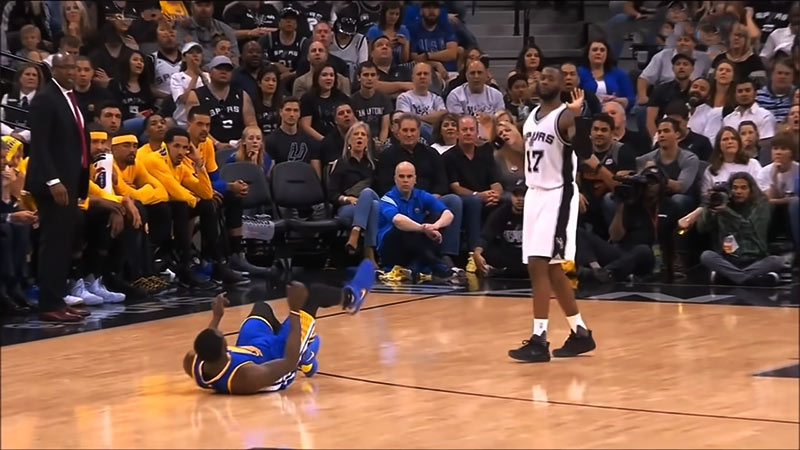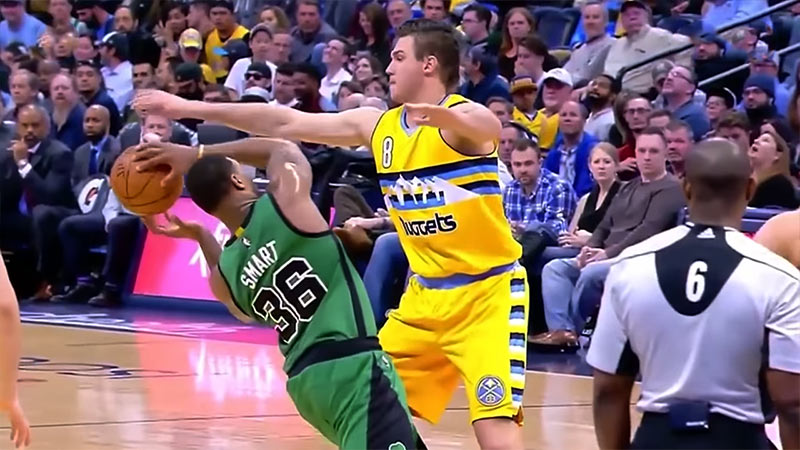Basketball is a fast-paced and physically demanding sport that requires skill, agility, and strategy.
However, like any other sport, basketball has its fair share of tactics and techniques that players employ to gain an advantage. One such controversial tactic is the flop.
In this article, we will explore what a flop is, its legality in basketball, when officials call it a flop, the consequences for players who engage in flopping, the history of flops in basketball, and provide examples of flops in the NBA.
What is a Flop in Basketball?
In basketball, a flop refers to a player intentionally exaggerating or faking the impact of contact with another player in order to deceive the officials into calling a foul.
It involves a player pretending to be fouled or knocked off balance to gain an unfair advantage. Flopping goes against the spirit of fair play and sportsmanship.
Is Flop Illegal in Basketball?
While flopping is not explicitly illegal in basketball, it is widely regarded as an unethical tactic that goes against the principles of fair play and sportsmanship.
Flopping involves a player intentionally exaggerating or faking the impact of contact with another player, with the intent to deceive the officials into calling a foul.
This deceptive behavior can disrupt the flow of the game and unfairly influence the outcome.
Recognizing the negative impact of flopping on the integrity of the sport, basketball leagues, including the NBA, have implemented rules and penalties to discourage players from engaging in such behavior.
Although it is not a criminal offense, players who flop can face disciplinary actions and fines.
The NBA, in particular, has taken significant steps to address flopping. The league reviews game footage regularly to identify instances of flopping and imposes fines on players found guilty of this unsportsmanlike conduct.
The fines for flopping increase for repeated offenses, with players potentially facing suspension for habitual flopping.
The introduction of penalties and disciplinary measures demonstrates the seriousness with which basketball authorities view flopping.
These measures aim to preserve the integrity of the game, ensuring that players compete fairly and honestly without resorting to deceitful tactics.
When Do Officials Call a Flop in Basketball?
Determining whether a player has flopped can be a challenging task for officials, especially considering the fast pace of the game and the split-second decision-making required.
However, officials are trained to recognize instances of flopping and make judgment calls accordingly.
Officials typically call a flop when they believe a player has embellished or exaggerated contact in an attempt to draw a foul.
While there is no foolproof method to identify flops, officials consider several factors when making their decision:
Force of contact
Officials assess the amount of contact made between players. If the force of contact is minimal or insignificant, but the player reacts dramatically, it raises suspicions of flopping.
Player’s reaction
The player’s reaction to the contact is an important aspect. If a player dramatically falls to the ground, flails their arms, or clutches body parts that were not affected, it suggests a potential flop.
Context of the play
Officials take into account the context of the play when evaluating whether a flop has occurred. They consider factors such as the position of the players, the timing of the contact, and the player’s history of flopping.
It is important to note that officials have limited time and angles to make these determinations. While they strive to make the correct call, there may be instances where a flop goes undetected or a legitimate foul is mistaken for a flop.
The challenge of identifying flopping in real-time has led to discussions about the use of technology, such as instant replay, to assist officials in making more accurate decisions.
What Happens When a Player Involves In Flopping?

When a player is caught flopping, they may face several consequences.
Fines
In professional leagues like the NBA, players can be fined for engaging in flopping. The fines typically increase for repeated offenses. The purpose of fines is to discourage players from resorting to this deceptive tactic and maintain the integrity of the game.
Technical Fouls
In addition to fines, players who flop may also receive technical fouls. A technical foul is called when a player violates the rules of the game or displays unsportsmanlike behavior. Accumulating technical fouls can lead to ejections from the game.
Suspensions
In severe cases, players involved in repeated instances of flopping may face suspensions. These suspensions can range from a few games to more significant periods, depending on the frequency and severity of the flopping incidents.
Suspensions serve as a deterrent and send a clear message that such behavior will not be tolerated.
Reputational Impact
Flopping can also have a negative impact on a player’s reputation. It can lead to criticism from fans, opponents, and even fellow teammates.
Players who gain a reputation for flopping may find themselves labeled as unsportsmanlike or lacking integrity, which can affect their standing within the basketball community.
League Reviews
Basketball leagues, including the NBA, employ video reviews to identify instances of flopping that may have gone unnoticed during the game. League officials analyze game footage to determine whether a player has engaged in flopping.
If a player is found guilty, appropriate action is taken, including fines and other disciplinary measures.
History of Flops in Basketball
Flopping is not a recent phenomenon in basketball. It has been a part of the game for decades, although it has gained more attention and scrutiny in recent years.
Early Instances
Flopping is not a recent phenomenon in basketball. It has been present in the game for decades. Players from different eras have used various tactics to exaggerate contact and draw fouls.
However, the awareness and scrutiny around flopping have increased significantly in recent years.
Evolution of Tactics
As the game of basketball has evolved, so have the tactics used for flopping. Players have become more adept at recognizing opportunities to exploit the rules and referees’ judgment.
They have developed skills to make minimal contact appear more severe through exaggerated reactions, falls, or theatrical gestures.
Increased Attention
In recent years, flopping has gained greater attention and criticism due to the advancement of technology and increased media coverage.
With the availability of multiple camera angles and slow-motion replays, instances of flopping can be scrutinized more closely, leading to public debates and discussions about its impact on the game.
League Responses
Basketball leagues have recognized the negative implications of flopping and have taken measures to address it. The NBA, for example, introduced fines for flopping in 2012, with the amount increasing for subsequent offenses.
This initiative aimed to discourage players from engaging in deceptive behavior.
Continuous Battle
The battle against flopping continues as players constantly find new ways to gain an advantage. The challenge for leagues and officials is to strike a balance between allowing legitimate fouls to be called and penalizing those who manipulate the rules through flopping.
Ongoing discussions and adaptations to rules and regulations are necessary to maintain fairness and the integrity of the game.
Example of Flops in the NBA

The NBA, being the most popular basketball league globally, has witnessed numerous instances of flopping. Let’s explore a few notable examples:
LeBron James
In a game against the Indiana Pacers during the 2013 NBA playoffs, LeBron James was accused of flopping after exaggerating minimal contact. This incident sparked a heated debate about the prevalence of flopping in the NBA.
Manu Ginobili
The former San Antonio Spurs player was known for his crafty style of play, which occasionally involved flopping. His theatrical falls and reactions to contact garnered both praise and criticism throughout his career.
Chris Paul
As one of the league’s premier point guards, Chris Paul has also faced accusations of flopping. His ability to draw fouls by embellishing contact has earned him a reputation as a master flopper.
James Harden
Harden’s offensive prowess is often coupled with his ability to draw fouls through flopping. His exaggerated reactions to contact have led to numerous foul calls and sparked debates about the ethics of flopping.
Marcus Smart
The Boston Celtics’ guard has developed a reputation for his propensity to flop. Smart’s dramatic falls and reactions have drawn the attention of fans, opponents, and officials alike.
FAQs
Are flops only seen in professional basketball?
No, flops can occur at all levels of basketball, from amateur leagues to professional competitions.
While flopping may be more prevalent in high-profile professional leagues due to the stakes and visibility, players at any level may attempt to use this tactic to gain an advantage.
Can flopping be considered a form of cheating?
While flopping is not explicitly illegal, it is often seen as unsportsmanlike behavior and goes against the principles of fair play. Flopping involves deceiving officials and attempting to gain an unfair advantage by exaggerating or faking contact.
This behavior is generally frowned upon within the basketball community and is not in line with the spirit of the game.
How can officials distinguish between a legitimate foul and a flop?
Distinguishing between a legitimate foul and a flop can be a challenging task for officials. They rely on their experience, judgment, and knowledge of the game to make this determination.
Officials take various factors into account, such as the force and nature of the contact, the player’s reaction, and the context of the play.
They aim to assess the genuineness of the contract and determine whether a player has intentionally exaggerated or faked the impact to deceive the officials.
Can flopping affect the outcome of a game?
Yes, flopping can indeed influence the outcome of a game. When a player successfully flops and convinces the officials to call a foul, it can alter the momentum of the game.
The opposing team may be penalized with undeserved free throws, potentially leading to a swing in points.
In some cases, a flop can even result in the ejection of key players, further impacting the outcome of the game. Therefore, flopping can have a significant impact on the final result.
Are there any measures to prevent flopping?
Leagues like the NBA have recognized the negative impact of flopping on the game and have implemented measures to discourage this behavior.
They have introduced fines and penalties for players who are found to be flopping, with the severity of the punishment increasing for repeat offenders.
The threat of fines and potential disciplinary action aims to deter players from engaging in flopping.
Bottom Line
Flops continue to be a controversial aspect of basketball, with players using them as a tactic to gain an advantage and referees tasked with distinguishing between genuine fouls and instances of embellishment.
While efforts have been made to discourage flopping through fines and penalties, it remains a contentious topic within the basketball community.
As the game evolves, it will be interesting to see how the rules and regulations surrounding flopping adapt to maintain fairness and integrity in the sport. Best wishes.







